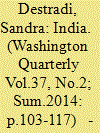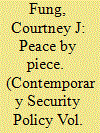|
|
|
Sort Order |
|
|
|
Items / Page
|
|
|
|
|
|
|
| Srl | Item |
| 1 |
ID:
132045


|
|
|
|
|
| Publication |
2014.
|
| Summary/Abstract |
During the early part of the 21st century, Chinese academic circles made judgments and forecasts about US. war aims in Afghanistan and the Middle East, the possible process of the wars, and outcomes of postwar reconstruction. After the U.S.-led attack on Afghanistan on October 7, 2001, and its military invasion of Iraq on March 20, 2003, these big events were analyzed in the context of the international politics of the time. Since these two conflicts are coming to a conclusion, at least in their direct military scope, it is time to look back upon the forecasting framework to see whether alterations and improvements can be made. On December l8, 2011, all American combat troops pulled out of lraq, and the end is in sight for U.S. withdrawal from Afghanistan-either in December 20l4, or thereafter.
|
|
|
|
|
|
|
|
|
|
|
|
|
|
|
|
| 2 |
ID:
133163


|
|
|
|
|
| Publication |
2014.
|
| Summary/Abstract |
The year 2014 will prove crucial for Afghanistan. The presidential elections will shape the country's political future, both who will govern and how much the process of democratic consolidation will have advanced. On the military front, by the end of the year, the International Security Assistance Force (ISAF) mission is expected to withdraw all combat troops from the country. While the United States and other Western countries are planning to stay engaged in Afghanistan after 2014 through the presence of training and counterterrorism forces, in late 2013 and early 2014 the difficulties in finalizing a Bilateral Security Agreement (BSA) between the United States and Afghan governments led to calls for a "zero option"-a complete departure of all foreign troops from Afghanistan by the end of 2014, leaving the country alone to manage its security, train its armed forces, and fight extremist groups.
|
|
|
|
|
|
|
|
|
|
|
|
|
|
|
|
| 3 |
ID:
188611


|
|
|
|
|
| Summary/Abstract |
How do states respond to peacekeeper fatalities? Peacekeeper fatalities incur costs for contributing states, leading to recalculations of whether voluntary troop deployments generate benefits. Yet it remains unclear how states with non-democratic regime types respond to peacekeeping troop fatalities, whether the ensuing foreign policy decision rests on tactical decisions to continue troop contributions to the mission, and if states affix the same costs to every peacekeeper fatality regardless of how the fatality occurs. This article builds upon existing studies with a detailed case study of China, a non-Western, non-liberal UN troop contributor. China only recently experienced peacekeeper fatalities by malicious acts, which prompted China to become an emerging policy leader regarding peacekeeper safety and security. China’s policy response highlights discomfort about accepting higher levels of danger as a given for UN peacekeeping, with implications for the debate on the robust use of force and China’s approach to international institutions.
|
|
|
|
|
|
|
|
|
|
|
|
|
|
|
|
| 4 |
ID:
170308


|
|
|
|
|
| Summary/Abstract |
A fundamental question facing global governance today is whether the UN peacekeeping regime can function with enough skilled troops to execute increasingly demanding and complicated mandates. The People’s Republic of China is informally thought of as a potential lead troop-contributing country. China typically deploys non-combat enabler troops, and recently began deploying combat troops, which may have to engage in live fire to defend the mandate. The risks and costs associated with dispatching combat troops challenge the benefits that China derives from supporting peacekeeping. I first establish China’s feedback mechanisms to facilitate simple and complex learning against China’s peacekeeping trajectory and motivations for participation. I then address the implications of China’s combat troop deployment, focusing on the UN Multidimensional Stabilization Mission in Mali and the UN Mission in South Sudan. The article draws insights from interviews with Chinese foreign policy elites and UN officials, and participant observation at the UN Department of Peacekeeping Operations.
|
|
|
|
|
|
|
|
|
|
|
|
|
|
|
|
|
|
|
|
|